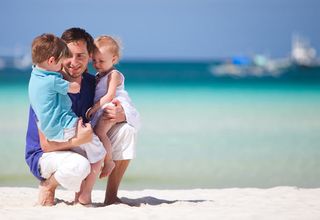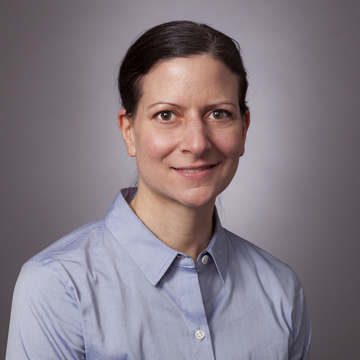Becoming a Dad May Lower Gay Men's HIV Risk

Many gay male couples are raising kids (about one in five gay male couples by some estimates), and now new research on a small sample reveals how child-rearing impacts same-sex partnerships, finding the men become less interested in sex and more focused on their little ones.
"When gay couples become parents, they become very focused on the kids, they are tired, there is less time for communication and less desire for sex," Colleen Hoff, professor of sexuality studies at San Francisco State University, said in a statement. "They go through a lot of the same changes as heterosexual couples who have kids."
Overall, men did say parenthood put a damper on sexual satisfaction, though many didn't let it taint their relationship satisfaction. And while men who were in "open" relationships before kids continued to agree that sex outside of the partnership was still OK, there often wasn't time for such affairs. These findings suggest the switch to parenthood may also reduce HIV risk for these gay men.
The findings, detailed in the journal Couple and Family Psychology, come amidst political debate regarding the legality of same-sex marriage and whether gay parents put kids at a disadvantage; recent studies have found strong evidence that kids raised by same-sex parents do just fine, if not better, compared with children of heterosexuals.
Hoff and colleagues hypothesized that becoming parents could change the gay couple's lifestyle in such ways that would reduce risky sexual behavior and as such reduce their risks of contracting HIV. Conversely, the stress of parenting could lead to more risky behaviors, such as infidelity and unprotected sex with outside partners, they surmised.
(In 2006, men who identified themselves as gay accounted for 48 percent of HIV/AIDS cases overall, and men who said they have sex with men represented 51 percent of new HIV/AIDS diagnoses in the United States.)
Gay parents speak
Sign up for the Live Science daily newsletter now
Get the world’s most fascinating discoveries delivered straight to your inbox.
To find out, the researchers interviewed 48 gay male couples who were raising kids together in either Salt Lake City or San Francisco.
Raising kids seemed to bolster couples' commitments to one another and deepen their relationships. [5 Myths About Gay People Debunked]
A 46-year-old participant said, "It's brought us closer together … we have a common goal, you know, we have these two little people that are more important to us than ourselves and … it’s really cemented the bond between us."
Another father in the study, 54, said, "Seeing him as a caring, loving father has deepened my love and respect for him … I wouldn't have known those parts of him had we not had children. I think the experience of having children has let us each develop parts of ourselves that the other would not have seen."
Along with the emotional bond, the couples also noted less frequent sex, which most attributed to the demands of parenthood.
"[I]t's almost like we have to schedule it. It's not as spontaneous as it used to be and there's no spark when we do it. It feels so structured and it happens so infrequently … Because before we didn't have to worry about any interruptions; now it's like … I'm always constantly like 'Oh gosh is she gonna walk in?' … But sometimes we're so tired it doesn't matter that she's not here; we're so tired we just want to go to bed," said a 30-year-old participant.
Open relationships
One surprising finding is that becoming parents did not affect the couples' sexual agreements.
"There wasn't the shift that we thought we might find," Hoff said. "For the most part, those who were monogamous before becoming parents said they stayed with that arrangement. Those who had open relationships before having children reported that they kept to that agreement."
The researchers were surprised to find that parenthood didn't affect couples' sexual agreements for "open" or "closed" relationships. [6 Scientific Tips for a Happy Relationship]
"There wasn't the shift that we thought we might find," Hoff said. "For the most part, those who were monogamous before becoming parents said they stayed with that arrangement. Those who had open relationships before having children reported that they kept to that agreement."
However, being dads did seem to change the frequency of outside sexual hookups, something that could reduce HIV risk.
"We've connected with people a couple times since we’ve been parents, but probably a lot less. I have a certain bandwidth — whereas when I was a single guy, 95 percent of that was sex; then as a coupled guy, 50 percent of it was sex; and then as you get older and now as a parent, it's like 3 percent of my life is sex. So it's not … my first priority," a 43-year-old in the study said.
Couples interviewed said they had fewer opportunities to talk about these sexual agreements with each other, with some indicating they felt uncomfortable talking to friends or doctors about their open relationship.
"Some men felt that there is this assumption that if you are a gay parent, you are monogamous," Hoff said in a statement. "This kind of stigma around gay parents' sexuality could be a concern if gay fathers are reluctant to talk to their physician about their sexual agreement and get tested for HIV."
Follow LiveScience on Twitter @livescience. We're also on Facebook & Google+.

Jeanna served as editor-in-chief of Live Science. Previously, she was an assistant editor at Scholastic's Science World magazine. Jeanna has an English degree from Salisbury University, a master's degree in biogeochemistry and environmental sciences from the University of Maryland, and a graduate science journalism degree from New York University. She has worked as a biologist in Florida, where she monitored wetlands and did field surveys for endangered species. She also received an ocean sciences journalism fellowship from Woods Hole Oceanographic Institution.
